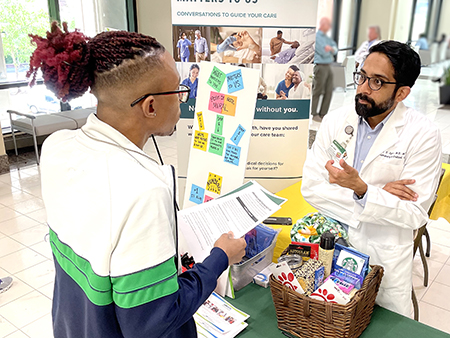 Healthcare Decisions Day is April 16, and UAB experts are providing recommendations for how to get started with advance care planning.
Healthcare Decisions Day is April 16, and UAB experts are providing recommendations for how to get started with advance care planning.
During a medical emergency or a serious illness or at the end of life, questions may arise about a patient’s medical treatment and how their care team should proceed. In instances where the patient is unable to vocalize or make these decisions for themselves, family members often have to take on the responsibility. While some people assume their loved ones know the type of treatment they want, one research study found that people guessed wrong on nearly one out of three end-of-life decisions for their loved one.
About 70 percent of people do not have an advance care plan, according to the Centers for Disease Control and Prevention. Healthcare Decisions Day is April 16, and experts at the University of Alabama at Birmingham Marnix E. Heersink School of Medicine are encouraging patients to use the week of April 16 as an opportunity to talk with their loved ones about their care preferences during a medical emergency or at the end of life. Research shows that, by having these conversations about future medical treatment and having a plan in place, a patient is more likely to get the care they want.
“We recommend patients have these conversations with their loved ones while they are still doing pretty well,” said Rodney Tucker, M.D., director of the UAB Center for Palliative and Supportive Care and professor in the UAB Division of Gerontology, Geriatrics and Palliative Care. “By having these conversations earlier, we hope this helps relieve anxiety and take away some of the burden on your loved ones who may have to make medical decisions on your behalf one day.”
 The week of April 16, employees and patients across both UAB Hospital campuses were invited to learn more about how to begin those important conversations prior to an emergency or end-of-life crisis.What is advance care planning?
The week of April 16, employees and patients across both UAB Hospital campuses were invited to learn more about how to begin those important conversations prior to an emergency or end-of-life crisis.What is advance care planning?
Advance care planning is not just for people getting older; it helps adults at any stage of life discuss and prepare for future decisions about their medical care should they encounter a serious illness where they are unable to communicate their medical decisions. It ensures that the person appointed to make these decisions for a patient understands their personal values, life goals and preferences regarding their medical care.
Tucker says a living will and last will are not the same thing. A living will lays out one’s preferences about future health care treatments. A final will lays out how one’s property and assets will be distributed after death.
How to get started
To get started with advance care planning, Tucker recommends that everyone determine what matters most to them. The Conversation Project has a helpful toolkit to help people get started at theconversationproject.org.
“These decisions should be reflective of what matters to you and how you want to live, not just on your end-of-life preferences,” Tucker said. “Think about specific situations you may see yourself in, and break down any decisions you would like to make. Weigh the pros and cons, risks and benefits. These conversations should always be in the cultural context of a family accounting for belief systems, lived experience, etc., as a ‘one size fits all’ document is not necessarily appropriate for some cultures and families.”
Some questions to reflect on include:
- What does a good day look like to you? Is it spending the day with family and friends? Enjoying your favorite activities? Something else?
- What do you need to enjoy a good life through the end of life?
- What or who supports you through difficult times? Examples may include faith, culture, family, friends or pets.
- Where and how do you want to live? Do you need to live with a loved one? Do you need to scale down or consider moving to a one-level building? Do you want to be moved into a care facility?
- How do you want to maintain social interactions?
- What surgical procedures or health measures are you willing to take? Examples may include thinking about things such as dialysis or surgeries.
- Whom do you want to make these decisions for you?
- What kind of life-sustaining measures do you want or not want? Consider ventilation, feeding tubes, CPR, etc.
Tucker recommends trying to finish this sentence: “What matters most to me through the end of my life is ….” Some ideas include being able to recognize family members, being independent or being able to spend time with loved ones.
How to have this conversation with loved ones
While discussing health care and end-of-life preferences can sometimes be awkward and difficult, these conversations can help ensure that a loved one’s health care wishes are followed.
The Conversation Project has a helpful toolkit to get started with advance care planning at theconversationproject.org.
First, an individual should take some time to determine who needs to be in the discussion and then determine a time and place where they would feel the most comfortable having this discussion with those people.
“Start by saying, ‘I want you to know what my wishes are and how I want to live,’” Tucker said. “Explain how important this is to you. Assure them that this does not mean you are giving up or planning to need end-of-life care anytime soon, but that you want to be honored and in control when that time comes.”
Tucker says it is not necessary to talk about everything or talk to everyone in the first conversation. Some people may be nervous and may need more time to be ready to talk; but every time a conversation is started, it helps individuals be one step closer to making sure their wishes are fully known.
“Your preferences may change, and that is OK,” Tucker said. “We recommend having this conversation over time, so your trusted people can stay up to date on your wishes.”
Tucker also recommends sharing preferences with health care providers.
“Tell your provider what matters most to you, what brings you strength and who speaks for you medically,” Tucker said. “If you are diagnosed with an illness, talk to them about all your options, including your options for not continuing medical treatment.”
Next steps
After discussing a living will with family members and health care providers, there is an option to record these conversations in a legal document, which is known as an advance directive. An advance directive has two parts: a health care proxy and a living will. A health care proxy involves naming the person appointed to make health care decisions on the patient’s behalf. A living will lists an individual’s preferences for medical treatment should they no longer be able to speak for themselves.
One UAB doctor has designed a first of its kind pallipulm program that uses telephonic palliative care nurse coaching to guide patients living with COPD and their families. Learn more here.
“While the document is an available option, some people may not feel comfortable putting their preferences in a legal document, and that is OK,” Tucker said. “The most important thing about this process is to have the conversation and ensure your physician and your family members know who the person is that you want making these decisions for you. The document is just a small part of it. If you choose to write it down, make sure your doctors and family have a copy of it.”
What Matters: Healthcare Decisions Week at UAB
On April 17, 18 and 20, from 11 a.m.-2 p.m., there will be booths located throughout UAB Hospital, UAB Hospital-Highlands and the Kirklin Clinic of UAB Hospital with resources about how patients and UAB employees can determine what matters to them and learn how to have an informed conversation around next steps for medical treatment.
“At UAB, we want to focus on what matters to our patients in addition to what is the matter with them and ensure their care is aligned with both of these,” said Jennifer Hicks, MSHA, administrative director of the UAB Center for Palliative and Supportive Care.
In 2019, UAB Medicine was recognized as an Age-Friendly Health System by the John A. Hartford Foundation and the Institute for Healthcare Improvement. This system recognizes hospitals acknowledged as working to make high-quality care for older adults even more tailored to patients’ goals and preferences.
The Age-Friendly Health Systems initiative is based on a series of practices focused on addressing four elements of care for older patients:
- What Matters: Know and align care with each older adult’s specific health outcome goals and care preferences, including but not limited to end-of-life care, and across settings of care.
- Medication: If medication is necessary, use age-friendly medications that do not interfere with what matters to the older adult, mobility or mentation across settings of care.
- Mentation: Prevent, identify, treat and manage dementia, depression and delirium across settings of care.
- Mobility: Ensure that older adults move safely every day in order to maintain function and do what matters.
“What matters is at the heart of UAB’s Healthcare Decisions Week,” Hicks said. “When your health care team knows what matters and what is important to you, it makes it less scary and opens the door to have an informed conversation around next steps for medical options.”
“This week is all about raising awareness of how important these conversations are and converting that awareness into action,” Tucker said. “We hope that, through this initiative, we can equip our patients, faculty and staff with the resources they need to have the discussion about what matters to them and encourage others to do the same.”
